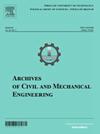Solid-state welding of UFG copper rods with conical face by means of friction heat impulse
Abstract
Solid-state friction welding of ultra-fine grained materials (UFG) is a complex process to implement. Exceeding the recrystallization temperature during the process causes degradation of the material’s properties. The process temperature can be reduced by limiting the heat power. Using standard friction welding machines and parameters, it is difficult to achieve an appropriately low heat power. The welding tests of Cu-ETP copper with an UFG structure were carried out on a prototype rotary friction welding machine. It enables welding materials with extremely short friction times and high pressure forces. A given set of non-standard/sharp parameters influences the generated heat power. Its characteristic course is called the friction heat impulse (FHI). The use of FHI allows the energy to be reduced to the minimum necessary to obtain a joint. In order to obtain better joint conditions in a short welding time, a conical surface was used on one of the welded samples. The friction welding tests carried out using the FHI method and a prototype machine showed that the average hardness value of the joints increased slightly from 129 HV0.2 to 130 HV0.2. Additionally, the tensile strength remained at the same level as the UFG base material. The results proved that it is possible to weld UFG copper rods with conical face under recrystallization temperature without any signs of degradation of the UFG structure.

 求助内容:
求助内容: 应助结果提醒方式:
应助结果提醒方式:


